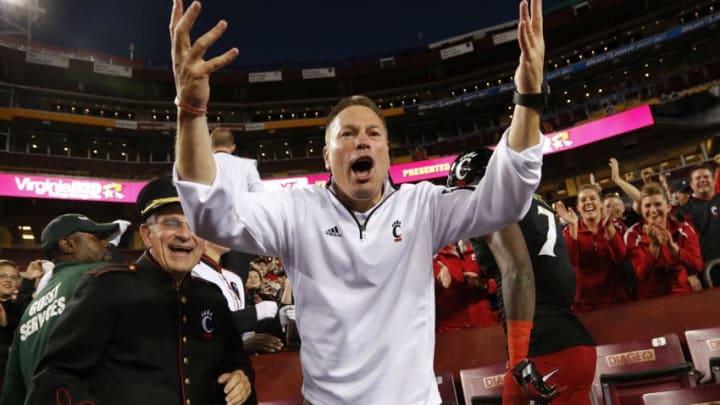Butch Jones was fired at Tennessee on Sunday morning. Brian Kelly’s Notre Dame team fell out of the College Football Playoff race.
Earlier this morning, we took a look at the career paths of national championship head coaches in this week’s edition of Sunday Morning Quarterback. Not included on this list, though, were two head coaches who followed similar career paths with divergent results.
Butch Jones and Brian Kelly share two common stops on their respective resumes. Kelly spent three years at Central Michigan from 2004 to 2006. He then parlayed his success with the Chippewas into three years at Cincinnati. After leading the Bearcats to a Big East title and a Sugar Bowl appearance in 2009, Kelly left before the bowl game to take the vacant job at Notre Dame.
Jones also got his head coaching start at the FBS level at Central Michigan, taking over the program between 2007 and 2009 after Kelly’s departure to Cincinnati. When the Fighting Irish came calling for Kelly, the Bearcats went back to the Mount Pleasant well for their new head coach. Butch Jones spent three years at Cincinnati patrolling the Nippert Stadium sidelines before his own Power Five opportunity came at Tennessee.
Waking up this morning, one of the duo is now unemployed and the other is reeling after a lopsided loss to a rival. Let’s look quickly at the similarities and differences between these two coaches.
What is similar about the career paths of Brian Kelly and Butch Jones?
The stops along the way are the first place to look. Brian Kelly and Butch Jones each spent three years at Central Michigan, and each spent another three years at Cincinnati. Those similar time lines are no accident, as Mark Dantonio — the Bearcats coach before Kelly — also parlayed a three-year stint at Cincinnati into a Power Five job at Michigan State.
It seems like that three-year window is the optimal period to prove oneself at Cincinnati. Either a powerhouse comes calling, or a coach loses the faith of the fan base. We saw that happen last season in Tommy Tuberville’s fourth and final year with the Bearcats.
Kelly was 53-20 in his stops at Central Michigan and Cincinnati. Jones went 50-27 in his six seasons at the helm of the Chippewas and Bearcats. Both men won a share of two Big East titles as well.
What is different about the career paths of Kelly and Jones?
There are some differences, though, between eerily similar resumes. Brian Kelly enjoyed better success at Cincinnati, leading the Bearcats to two BCS bowls in his three seasons. Butch Jones could never quite replicate that success rate.
Interestingly, though, the results flip if you look at each man’s previous stop. At Central Michigan, Jones won two MAC championships to one for Kelly. It was that ability to maintain and build upon Kelly’s dominance that was a big factor in why Cincinnati brought him over in the first place.
More importantly, though, Central Michigan was a first shot at head coaching for Jones. That wasn’t the case with Kelly, who put in over a decade turning Grand Valley State into a Division II powerhouse. The Lakers won back-to-back Division II national championships under Kelly in 2002 and 2003, his last two years with the program before Central Michigan came calling.
What can we learn from these two examples?
That disparity in experience and success rate goes a long way toward explaining the divergent career paths of the two men since their blocks of time with the Chippewas and Bearcats. Butch Jones was always following in the shadow of Kelly, and he benefitted from Kelly’s recruiting during his first half-decade as a head coach.
Once that advantage was gone, so too was the magic of Jones. Tennessee fans learned that the hard way over the past five seasons, and now they are left to fire up the coaching search anew.
Next: Latest 2018 NFL Mock Draft entering Week 11
Not every team can be like Notre Dame, plugging in coaches with previous experience and turning into national championship contenders. Maybe this time, instead of drawing from the list of usual suspects, the Volunteers should look to the experience among their coordinators and promote from within. After all, it worked with Robert Neyland and Phillip Fulmer.
